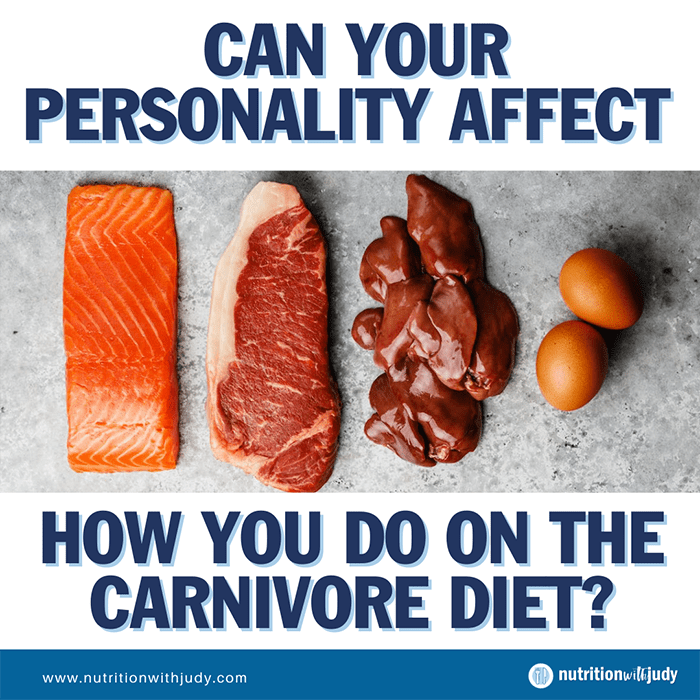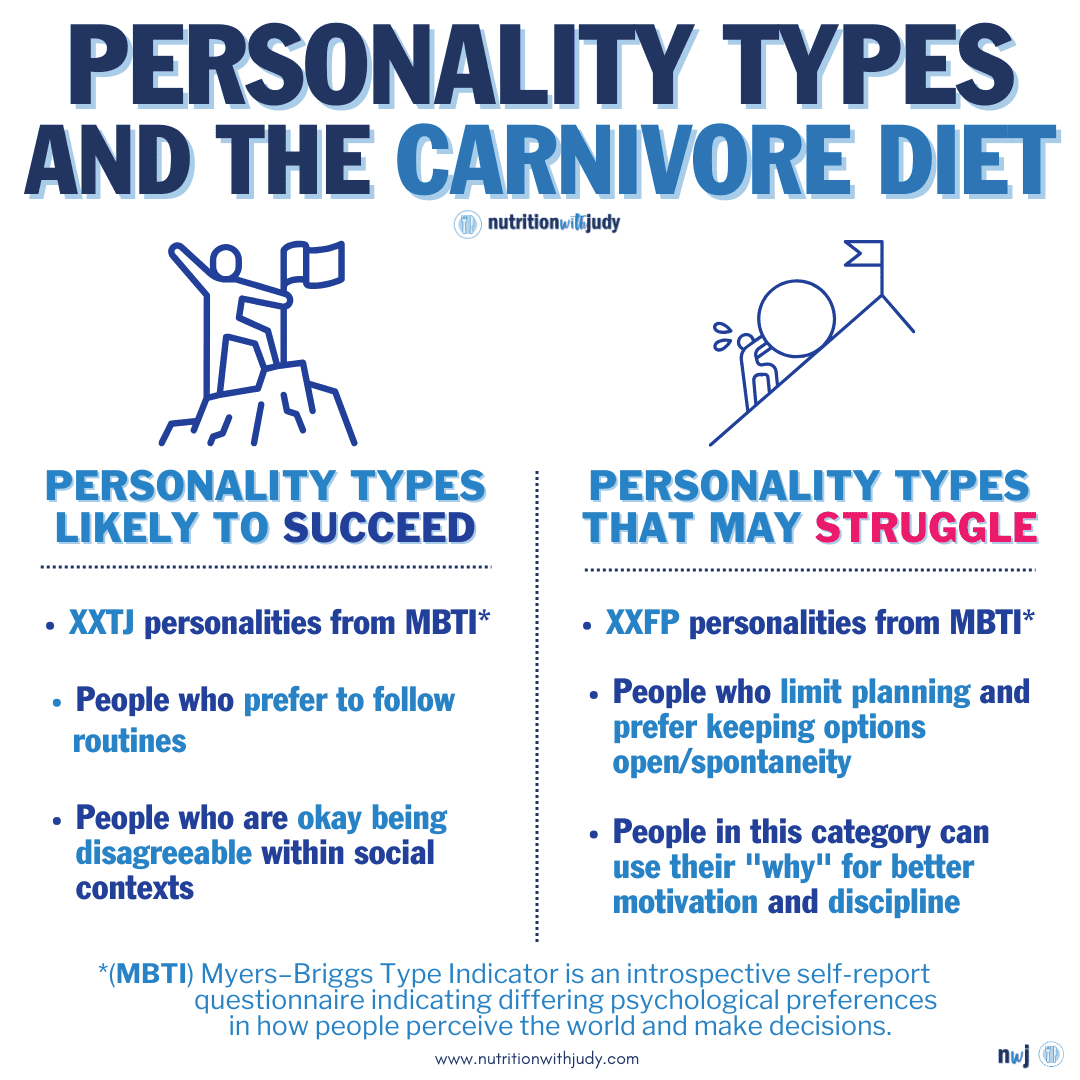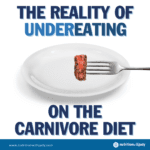

Can Your Personality Affect How You Do on the Carnivore Diet?


Written by Guest Author: Robin Nemesszeghy
My initial exposure to personality type theory came through the MBTI. A good friend of mine I knew from high school found the 16 personalities test online and took it. She forwarded it to me and informed me that her results “described her to a ‘T’”. I went through the test myself and found my results were uncannily accurate as well. Naturally, I had to find out more. My curiosity about personality types fueled further exploration as I wondered how this could impact an individual’s trajectory in life in so many various ways including diet. Before applying my curiosities to how personality can affect individual experience on the carnivore diet, let’s explore some of the different personality theories.
The Three Main Personality Theories
The MBTI
The MBTI (Myers-Briggs Type Indicator) is the most widely used theory in practice. Businesses and organizations often hire MBTI-certified professionals who are trained in administering the Myers-Briggs assessment to meet with employees and get a better sense of how they operate. These businesses understand that in order to optimally run and effectively work as a team, they need to account for unique preferences among their employees.
Unfortunately, most sites portraying the MBTI only brush the surface and don’t mention the main processes involved referred to as the 8 cognitive functions:
Observing Functions:
- Extroverted Intuition (Ne)
- Introverted Intuition (Ni)
- Extroverted Sensing (Se)
- Introverted Sensing (Si)
Deciding Functions:
- Extroverted Thinking (Te)
- Introverted Thinking (Ti)
- Extroverted Feeling (Fe)
- Introverted Feeling (Fi)
Each personality type is comprised of two observing functions (two ways in which you take in information) and two deciding functions (two ways in which you make decisions). I won’t go too deep into the specifics in this post since the complete theory takes time to get down (you can check out more about how the cognitive functions all come together here if you like).
I was always of the opinion that this theory had the greatest potential in terms of going deep and exploring the core of people — how people are when you strip away all their obligations and responsibilities — and I’m not alone in that opinion. When the theory is applied in a practical way, it has great potential.
The Big Five
In university, I was introduced to the Big Five, the most widely used theory in personality research studies and in institutions around the world. It suggests that individuals have varying degrees of the following five traits on a sliding scale, which can be recalled by the acronym OCEAN:
- Openness
- Conscientiousness
- Extroversion
- Agreeableness
- Neuroticism
This theory is famously advocated by clinical psychologist and university professor — as well as the father of well-known carnivore advocate Mikhaila Peterson — Jordan Peterson. I had the fortunate opportunity of obtaining my degree at the University of Toronto at the same time he was teaching his psychology class on personality — PSY230H: Personality and its Transformations — in early 2016. Back then, I was simply a student and he simply a professor, and the only thing he was known for around campus at the time was “the psych prof who recorded his lectures and put them up on YouTube”; and, like most professors in the psychology department at UofT, his lectures were such that students who weren’t even taking the course would sit in on them because they found them that insightful.
When I took Jordan Peterson’s class, I asked him during office hours why he had chosen to teach primarily about the Big Five. He told me the Big Five is what the psychology department preferred because it was “a dynamic system that’s ideal for conducting studies and gathering observations on correlations”. What exactly does that mean?
It means the theory allows you to make statements about how personality evolves and about patterns between individuals of various combinations of traits. In other words, statistical analysis.
It allows statements such as the following to be made:
- Extroversion tends to increase with age
- Individuals higher in openness tend to be lower in conscientiousness
- Individuals tend to be happier and healthier when they score higher on the first four traits and lower on neuroticism
- Individuals generally decrease in neuroticism and increase in agreeableness and conscientiousness with age
- Individuals lower in agreeableness tend to be in higher job positions
Enneagram
The third personality framework I have been exposed to in the years since then is the Enneagram. This is an interesting one. Where the Big Five focuses on traits and the MBTI focuses on your logical cognitive functions or processes — going off the logical ways in which you take in information, process it, and make decisions based on it — the Enneagram focuses on your emotional personality profile — in other words, your desires and fears.
There are 9 different types:
- Reformer
- Helper
- Achiever
- Individualist
- Investigator
- Loyalist
- Enthusiast
- Challenger
- Peacemaker
Each type has its own unique personality and set of behaviors, but they stem from a more emotional core.
There are many different Enneagram tests out there, but the best way to find your type is to take a free online test. Once you know your type, you can start to learn more about the traits and behaviors associated with that type. The talented musical artists of Sleeping At Last have written a song for each of the types, and boy is they spot on. Be sure to check out the song that corresponds to your type and to the types of your loved ones.
The Value of Personality Type Tools
Over the course of the years I spent introducing valuable typing tools to people — which I now do professionally — I’ve had varied responses to it. People told me their reasons to stay away from it. One of the most common ones I’ve heard was they didn’t want to put people in a box.
To that, I always tell people this: personality assessments and theories are a tool. And like any tool, it’s up to the user how they decide to use it. When used properly, it’s not about limiting people or putting them in a box. It’s actually quite the opposite. It’s about acknowledging the differences in people — the way they think, process information, and make decisions. It’s about understanding what these differences are, accepting them, and using them to find our own unique role in the world — so we can contribute alongside everyone else.
Everyone has their own unique role to contribute to the world. From my experience, people are happiest when they find that what they do aligns with their strengths and don’t try to force them to do what they aren’t interested in or don’t gravitate towards doing.
I also believe acceptance is the key to improvement. If we want to improve ourselves and the world around us, we have to accept ourselves and be aware of where we are currently at to figure out what exactly still needs improvement.
This is where knowing about differing personalities comes in — and even just general awareness of both ourselves and others (which in my opinion is the most useful thing personality theory can bring us).
Personality typing is an extremely valuable tool for communication; knowing the different types will help you understand where other types are coming from, and how they might think and process the world differently from you. This is a great thing because it allows us to all come together and contribute value to the world by being fully ourselves. Not only will we know who to call on for specific tasks, but we will also know who will enjoy doing those tasks and who can complete them most efficiently. People won’t be forced into working on things they don’t actually enjoy. That way, everyone has more time to work from their strengths and get everything done more efficiently while also being fulfilled by their work. It’s a win for everyone.
Now, don’t mistake me saying working from our strengths to be a justification for not searching for ways to improve on our weaknesses. Everyone has their natural weaknesses, and it’s good to work on them. But there’s a difference between being aware of and working on weaknesses and working from our weaknesses; ideally, you want to live and work from your strengths as you work to improve on your weaknesses and become aware of your blind spots. This should be a simultaneous and seamless process, not a process that’s removed from one another. Working from your strengths generally energizes and satisfies you; you can then use this energy to work on your weaknesses from a place of abundance and fulfillment.
Personality Types and the Carnivore Diet
As a personality specialist and coach, I can’t help but notice patterns when it comes to people — and the carnivore community is no exception.
I have been a part of the community since Mikhaila first created the “Lion’s Lair” group back around the 2018 time (which eventually evolved into the current open Facebook and Telegram groups she has up now). I have attended Rebekah Farmer’s Tailored Keto Health retreats, and tried out Bella the Steak and Butter Gal’s Steak and Butter Gang monthly meets (or “meats” as we would call them). Since then, I have become familiar with all the carnivore diet advocates in this space: from decade-plus carnivore veterans like Kelly Hogan and Anthony Chaffee to the recently emerging carnivore newbies (but definitely not knowledge newbies) like Bart Kay and Joey Schwarz — and of course Judy Cho (whose book Carnivore Cure is my #1 recommendation for anyone looking into a carnivore way of life).
The question that has always been on my mind throughout all my observations as well as my own struggles moving toward a carnivore way of life is “Does it take a certain type of person to commit to a strict carnivore way of life?”. Unsurprisingly, certain types do seem to fare better on a strict meat-only diet than other types. This might sound like bad news if you are not one of these personalities, but it doesn’t mean you cannot thrive on the carnivore diet. It just means you might have to tweak it and make it sustainable for your lifestyle, yourself — and your personality.
Which Personalities Fair the Best and Which Struggle With the Carnivore Diet?


You’re probably wondering who are the types that tend to fare the best, and who are the types who might struggle the most. If you know anything about the MBTI, you might have guessed the XNTJ/XSTJ types to fare the best and the XNFP/XSFP types to struggle the most.
If you’re looking at it through the lens of the aforementioned Big Five, you might observe that those who are higher in conscientiousness and lower in agreeableness tend to fare the best, while those who are higher in openness and neuroticism tend to struggle the most.
To put simply, this means that people who prefer to follow routines and are okay with being disagreeable with the tribe in social contexts are much more likely to maintain a strict carnivore diet. That’s pretty much the gist of it, but I can delve a little deeper into the two opposite ends of the spectrum of types.
Personality Types Likely to Succeed With the Carnivore Diet — XXTJ
I for one have always been someone who never wanted to care about or think about food. I’ve always viewed meals as “eat to live” rather than “live to eat”. Someone I told this to once suggested that the carnivore diet would be perfect for me due to this. But one thing I have noticed is that carnivore actually requires more planning and thinking since you have to plan your meals when going out, you cannot just eat anything someone puts in front of you, and you have to think ahead of time about how you order at a restaurant. All of the above works best when you create a system that works for you, keep to it, and focus on refining it over time.
This meticulous planning and system refining process is most often associated with INTJ types. They are the types who will wear the same clothes every day if they could just to avoid having to deal with the sensory environment too much. They deal with the external world as much as they need to in order to be efficient and tend to mostly operate on what leads to the best results long term. They focus on the future and never lose sight of the big picture, along with what consequences their actions lead to in the long run.
Carnivore diet advocates Anthony Chaffee, Bart Kay, and Joey Schwartz are among these XNTJ types.
Personality Types That May Struggle With the Carnivore Diet — XXFP
As an INFP myself, I prefer to keep my options open as much as possible and to do and eat whatever I feel like in the moment. I only like planning when I absolutely need to, and I plan so that I can remain as free as I can be to explore in the moment.
XNFP types may have a harder time with the carnivore diet due to how they prefer to function. However, their strong value system can prioritize health and what they put into their body as a personal value. I find what works best for me as one of these types is to always think about what I eat in terms of how it contributes to providing value. I remember to think about how I am choosing what’s best for my body rather than I am limiting what I can consume right now.
“I am choosing what’s best for my body rather than limiting what I can consume right now.”
I think about how my example and inspiration can motivate others to do what’s best for their own bodies. I think about how I would like to lead by the best example I can possibly be, and by eating in a way that supports my health. In doing so, I am helping others by inspiring and motivating them. I write it down on sticky notes in multiple places I know I will look to always remind myself of the big picture — what my actions will lead to — since INFP types can sometimes lose the big picture in favor of the details and how they feel in the moment.
That usually does the trick.
Work With Our Trusted Carnivore Diet Functional Nutritional Therapy Practitioners
This guest article was written by MTBI specialist and creative writer, Robin Nemesszeghy. Robin offers specialized coaching services with her own modified version of the MBTI and is available for a free discovery coaching call here.
The Nutrition with Judy practice is honored to be a trusted carnivore diet practitioner support serving clients from around the globe. We’re passionate about helping our clients achieve root-cause healing in order to lead the best quality of life possible that’s nearly symptom-free. Our team is dedicated to educating our community about the incredible benefits of the carnivore diet. We welcome you to explore our free resources and are always available to support you through personalized protocols. Our Symptom Burden Assessment (SBA) is the perfect starting point for discovering your root cause and is required to work with our team— you can learn more in-depth about this powerful tool here.
Start your root-cause healing journey today and contact us any time with any questions or concerns.
DISCLAIMER: This content is for educational purposes only. While we are board-certified in holistic nutrition and are nutritional therapy practitioners, we are not providing medical advice. Whenever you start a new diet or protocol, always consult with your trusted practitioner first.





